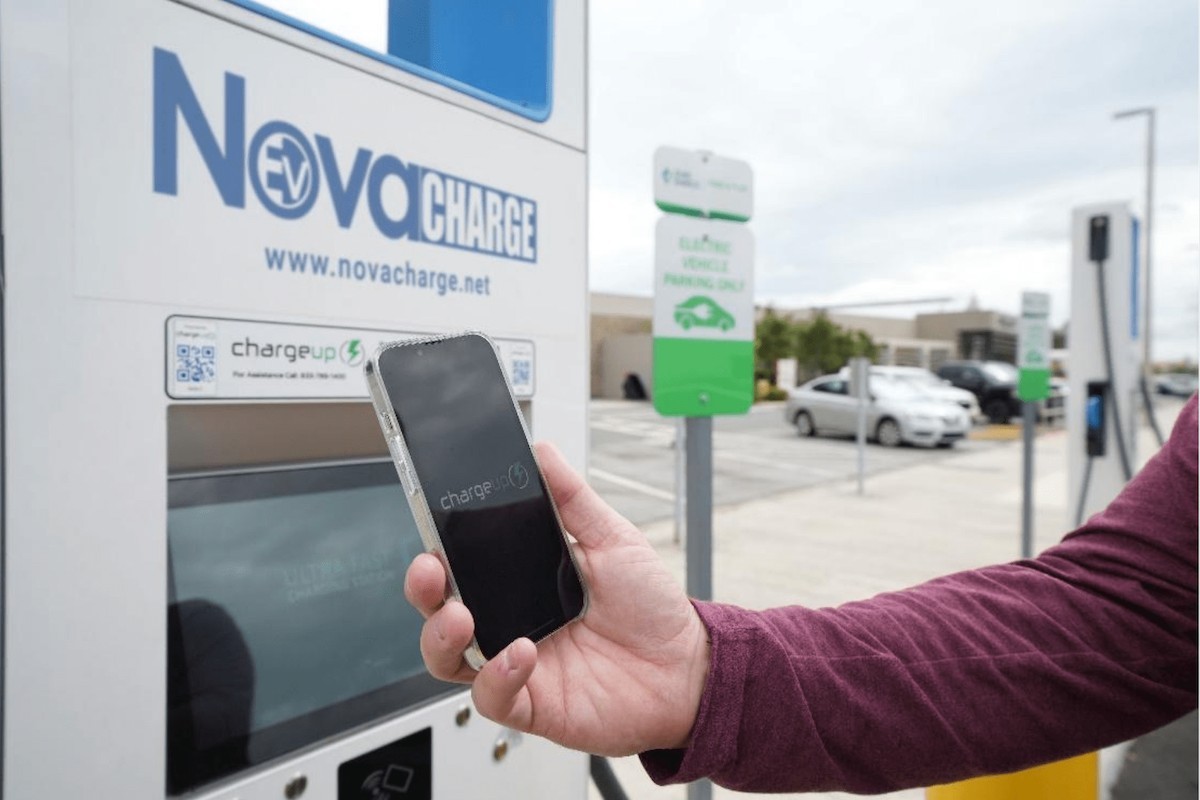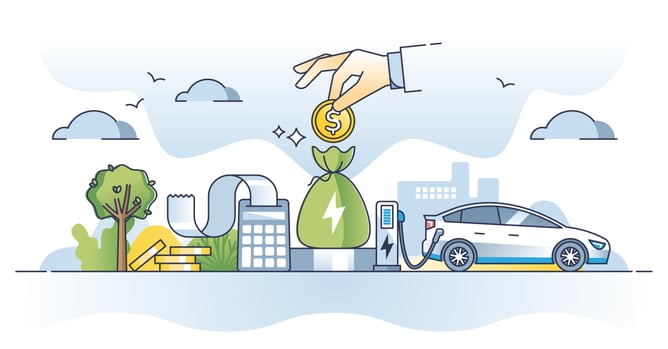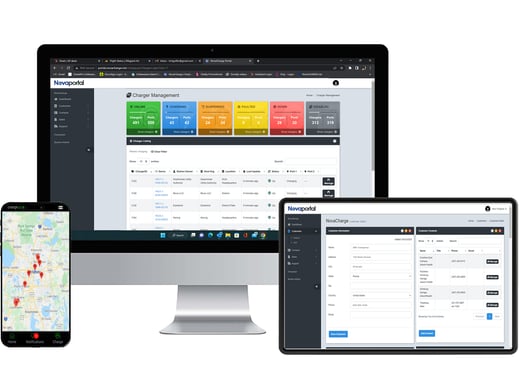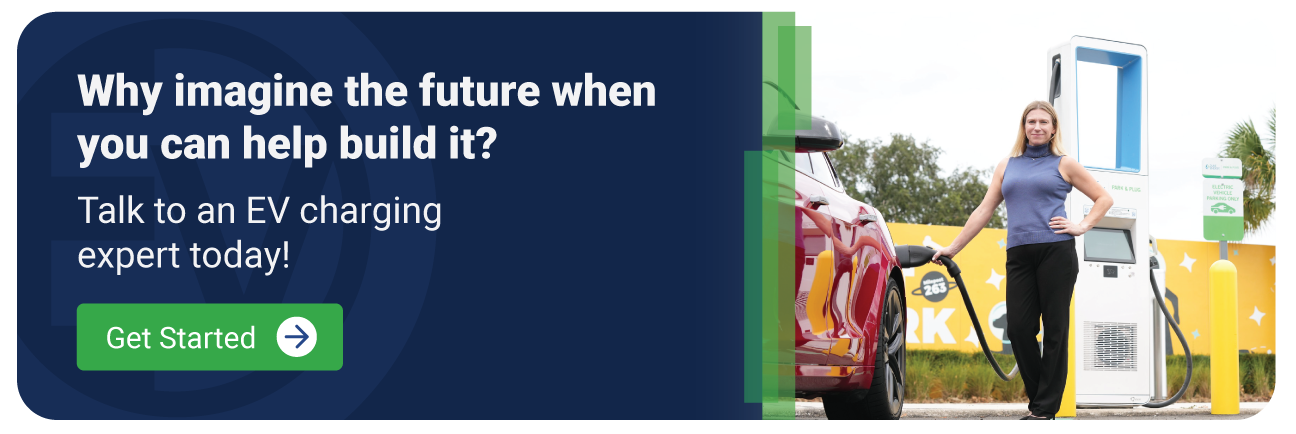The Basics: Commercial EV Charging Stations and Their Installation
Apr 27, 2023 | 10 MIN READ

Motivational speakers will confirm that, for many, getting started is the hardest part. That’s even more true when the endeavor involves change, learning, or simply something new. While EV charging seems new, the industry has been around for nearly 2 decades and, in that time, we’ve learned a lot.
One of the other things we’ve learned (thanks motivational speakers) is that one of the best ways to get started on a project or plan is to marry your ideas to an action, like reading a blog, or reaching out to experts. Thankfully, understanding EV charging stations and installation doesn’t need to be that complex, so let’s keep moving forward.
Quick Links:
Why Install a Commercial EV Charging Station
Revenue. Plain and simple. But, it’s obviously not just about the just revenue you can make from charging costs. Successful businesses and retail locations understand that diversified revenue streams make for a stronger business. They also understand that targeting the talent and customers they want takes a keen understanding of what draws them in. There are essentially four big reasons to consider installing a commercial EV charging station at your business or property.
You, or your business, likely desires:
- To increase sustainability efforts
- To attract top talent
- To attract high revenue customers or residents
- To add an additional and new revenue stream
- To increase net operating income
One of the more interesting opportunities comes from the understanding that, not only might you attract higher paying customers with more disposable income, but the EV driving customers you do attract are more likely to linger longer while their vehicle charges. That means more revenue for retail locations or retail properties.
Is Your Location Right for Commercial EV Charging?
Okay, so there’s opportunity, but how do you know if your location is right for a commercial EV charging station? While there are a few key questions you’ll want to ask, there are also a few good indicators regarding location choices.
Locations that make good candidates often feature a significant volume of vehicular traffic and are found in areas where drivers park and stay for a few hours. That means, more specifically, some of the following commercial locations:
- Airports
- Hotels
- Shopping Malls
- Transit Stations (Bus/Train)
- Hospitals
- Office and retail complexes
- Business districts
- Entertainment and sports venues
- Colleges/Universities/Schools
- Municipal or private parking lots
- Restaurants
- And more!
While it may seem like that means just about everywhere (and while that’s partially true), there are some other factors you’ll likely want to consider. We do want to mention that if you’re wondering if your urban, suburban, or rural location is suitable, consider that many urban areas are starting to build EV infrastructure, but it’s still lagging in rural or suburban areas. That presents a great opportunity, especially with EV charging incentives and grants available.
Still, you may want to consider EV adoption rates in your area as well as what EV infrastructure already exists. Again, don’t be daunted by nearby EV charging stations. In fact, one of the largest complaints from EV drivers is that there aren’t enough charging stations to be found– a full 44% claim there are no stations at all, while 23% claim there aren’t enough. In fact, it just may signal that there’s enough regional demand to warrant the investment.
You may also want to consider how many parking spaces you have available, total, as well as how you would allocate spots for EV charging, especially if spots are limited.
And, finally, you’ll want to think about what kind of capacity the electric grid can provide. While our ChargeUP charging platform management system can help you limit power consumption, strong demands and pulls on weak infrastructure can result in slow charging speeds.
Once you’ve realized that your location is the perfect place to get started providing EV infrastructure, you’ll want to consider working with an EV charging solution provider that provides turnkey solutions, guiding you through every step of the process, leaving you with a station ready to generate revenue.
After all, location is only part of the equation.
EV Charging Solution Considerations
The EV charging industry is still growing and nearly everyone is still learning. Often, the leaders and decision makers we work with have goals, and a vision, but are still in need of a lot of answers. There’s a lot to learn, but thankfully it, like your EV charging solution, doesn’t need to be complicated.
.png?width=93&height=400&name=NC70002019-min(1).png) EV Charging Hardware
EV Charging Hardware
What kind of EV Charging station should you install? What level? What type? For commercial locations, Level 2 and DC fast chargers are what you’ll need and want. Those are the two methods for public charging stations and provide more power per KwH than Level 1 chargers which are designed for home use.
It’s also important to understand the port, or the part that connects the charger to the car. Most EV models, for level 2 charging, use the J1772 connector. Tesla models, which are equipped with a proprietary port, also come with a converter allowing those vehicles to charge at any public EV charging station.
As for DC fast charging, most cars use a port called CCS or combined charging solution which looks like the J1772 connector but includes two additional high speed charging pins. Nissan and Mitsubishi, as well as some older model Kias, may use a CHAdeMO. Finally, for DC charging, Teslas can accommodate any type of Tesla charging station plug. They would need a converter to work with non-Tesla charging stations.
While DC fast charging is great, and some folks might think “Let’s just make them all fast,” there are some considerations to that technology including TCO (total cost of ownership), how much the EV can absorb during charging, and the pull from the grid. Further, when putting an EV charging station at a location with several hours or more of “dwell time,” Level 2 chargers can do the job (at lower TCO and save the challenge of power management or overburdening the grid).
And if you’re worried about power management and managing the stations themselves, it’s good to look at the available network as well.
EV Charging Platform Management System
While it’s wholly possible to install non-networked EV charging stations, the power of EV charging is best leveraged with networked chargers. Non-networked chargers are stand alone and, in that sense, they are alone. There’s no network to monitor them, no way to use dynamic pricing, no way to see if they’re online. Networked chargers make flexible business models, monitoring, and maintenance possible, and in a way that improves the experience for all parties.
Access to your charging stations, as the owner or host (who can manage stations for the owners), requires a robust network. However, not all EV charging networks are built the same. NovaCHARGE’s ChargeUP, in fact, offers full station transparency and powerful station administration tools that let the station host or owner create usage, application, and pricing rules, drilling down to the EV driver, the time of day, the location, usage data, and even whether your other stations are in use. That means you have unparalleled control over nearly every aspect of your charging station.

Additionally, you can set up alerts for just about every situation where you might need more information or to ensure your charging stations are providing the convenience and power drivers want. In fact, ChargeUP works with our AI-driven NovaBOT providing predictive service as well as level 1 support, making your job even easier and reducing truck rolls.
Finally, EV drivers will use the same charging platform management system, ChargeUP, to identify, find, and pay for charging so as a station owner, you want to be confident in the versatility, flexibility, and user experience. Unfortunately, many EV drivers struggle with the applications and the network, and that’s why NovaCHARGE put specific emphasis on building a highly reliable network in EV Charging. We guarantee 99.999% uptime, providing unparalleled accessibility to you and drivers.
EV Charging Station Support
In a world that continually seems to produce disposable goods and products with planned obsolescence, one of our goals is to ensure that our solution is future-proof and prepared for the changes that will inevitably come. When choosing your EV charging station manufacturer, you really want to focus on robust support through all stages of your relationship.
For example, we created application guides to help potential customers understand how EV charging stations fit into their business and how the flexibility of our business models can help you achieve your goals.
Prior to the installation process, we’ll make sure your site is ready (more on that in a moment) and provide ChargeUP training. We also provide one of the strongest warranties in the industry.
And, again, ChargeUP and that NovaBOT…it’s about support and assistance. You may love the idea of installing EV charging stations, but dread the administration and potential headaches created by failing hardware and software. NovaCHARGE's capabilities are purpose built to help you with both administration and maintenance and save you stress. That’s real support.
FAQs for Commercial EV Charging
We won’t get too into the nitty-gritty here, but there are a few things to consider when it comes to the installation process. Considerations range from site concerns to driver needs, but you’ll want to make sure you cover your bases (and we can help you do that).
Some great questions to get you started:
1. Will you need to make on site power/utility upgrades?
This will also factor into many decisions you make about how you manage power usage at your chargers. For example, businesses that require heavy power consumption at specific times of day will want to limit what kind of charging (and how many KwH can be pulled) happens during peak electricity usage.
For DC fast chargers, which can pull quite a bit from the grid, it's recommended to contact the utility for a power survey. For Level 2 chargers, you’ll need a good understanding of the power that’s available to you as well as the consumption shifts, if those are applicable.
Level 2? Level 2 and DC fast? This may, of course, depend on what you discover when researching the answers to Question 1 above.
3. How many EV charging stations/ports?
As we mentioned, the size of your area/lot and power availability will both help you determine what you can accommodate. Also, your desired business model, the density of EV’s in the area and desire to attract EV drivers will be considerations.
4. Do you have a preferred installer or are you looking for a full turnkey installation?Purchasing and installing EV charging stations are two separate actions. Consider working with a company, like NovaCHARGE, that provides a full turnkey solution and can provide both. This simplifies and streamlines the process. Or, we are happy to work with your preferred installer.
5. How will you handle administration, especially if you have multiple EV charging sites?This is not necessarily a hardware installation question, but will need to be considered as you work towards finalizing how charging stations will be managed and monitored. As the owner of the station, you have unparalleled control, but you can also set up additional station hosts and feature control to facilitate administrative access and support. For example, as a station owner, you can control pricing, but disable that feature for station hosts. ChargeUP makes this type of administration easy.
6. What incentives, grants, or funding exists to help you with your project?
Grants, incentives, and funding can help you better budget and determine what type of infrastructure you provide
7. More questions?You’ll want to talk to our team. There are, no doubt, a lot of questions regarding business models, installation, administration, maintenance and more, and we’re here for all of it.
We’ve assembled a team with decades of experience in the EV charging space and designed a solution with end users in mind, both owners and EV drivers. This isn’t a one size fits all solution. In fact, we'll consult and design it to be tailored to your needs, your site, and your goals. Reach out to us today, and let’s help you get on the road to rEVolution and rEVenue.
.jpg?width=600&height=400&name=nova_charge_highway-img-09_52517656005_o%20(1).jpg)